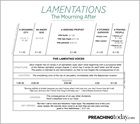Skill Builders
Article
Preaching from the Wild Edge of Sorrow

I preached a seven-week series on the intersection of the Jesus story and mental well-being, mental health, anxiety, grief, even depression. The series proved to be, as my 14-year-old son would say, “extra.” Meaning, there was a lot happening in the room each week as I navigated, through preaching people’s pain, resentment, sadness, loss, death, and experience of abuse.
Any time Christians gather together, there is a lot going on in the room; the stakes are high. None more so than the preaching moment. I’m consistently reminded of the words of Buechner: “The preacher deals out his note card like a riverboat gambler. The stakes have never been higher. Two minutes from now he (or she) may have lost his listeners completely to their own thoughts, but at this minute he has them in the palm of his hand. The silence in the shabby church is deafening because everybody is listening to it.”
In addition to the words of Jesus—"come to me all who are weary and burdened . . . and I will give you rest”—I found great assistance in sermon preparation for this mental health series in the form of Francis Weller’s book, The Wild Edge of Sorrow. In this book, Weller describes the grief retreats he hosts all over the United States. It turns out death is no respecter of persons: death comes to all races, genders, socio-economic groups. According to Weller, sharing our pain in healthy community is the only way we work through our grief and pain. Sharing and naming this pain is the only chance we have to begin to heal.
Depression vs. Chronic Grief
Weller also consistently distinguishes between depression and chronic grief. While grief can certainly lead to depression; depression and grief are not the same experience. Depression is a diagnosable mood disorder that causes a persistent feeling of sadness and loss of interest that can interfere with one’s daily life. Grief, however, is different. Grief is the soul’s attempt to say that a person or event caused us pain and in the midst of holding the pain, we feel deep sadness and surprising anger. Grief is the body’s way of saying “This is not how things are supposed to be!” Some of us will experience depression, all of us will experience grief.
Weller points out that grief sits within us each day as we go about our normal lives. “Grief rises and falls with every breath, clings to the chambers of the heart and makes each step we take a challenge. It is a dense space, filled with sensations that carry our tears and our palpable aching.”
Grief visits us at the most surprising times. Imagine standing on the beach with your back to the ocean. You are unable to turn around to anticipate the waves. Grief is the experience of having the waves crash into you. You do not know how high the waves will be or the frequency of their arrival.
Our Common Grief Journey
For the preacher this lived reality of stewarding our grief requires us to take inventory of the experiences that grieve us: church parishioners who ghost us and disappear from the life of the church; political partisanship that seeps into the minds of church members pretending to be gospel; ego and conflict and projection. The preacher would also do well to take note of the grief that haunts the women and men we preach to each week.
In my own preparation for this series, I was overwhelmed with profound sadness as it relates to the reality that all four of my grandparents are now deceased. I had shed tears over their deaths, but I had not grieved the truth that I was a grown man with no living grandparents.
Being sad about the death of a grandparent is not the same as grieving having no grandparents. We have a word for someone who loses a spouse to death (widow/widower). We don’t have words for a parent who loses a child or a child who loses a parent/grandparent. Probably because deep down we know that death leads us to the end of words; nothing will satisfy, nothing can soothe this kind of pain.
If I’m experiencing this kind of grief, of course everyone in the church body is also going through it. This is part of what can bond humans and believers together, our common grief journey.
Preachers cannot ignore the pain each person carries into the preaching moment. The preacher who does their grief work will have far more to offer a church than the preacher who moves through life repressing disappointment bumping from guard rail to guard rail. The preacher who does not do their own grief work will do far more damage than she or he can possibly imagine.
Weller notes this about the necessity of naming our grief: “We need to recover our right to ask for help in grief, otherwise it will continue to recycle perpetually. Grief has never been private; it has always been communal. Subconsciously we are awaiting the presence of others, before we can feel safe enough to drop to our knees on the holy ground of sorrow.”
You don’t make it through life without having to face the weight of loss. Grief is the result and it comes to us as a result of many common experiences: the death of a spouse, job loss, aging, divorce, financial ruin, betrayal of a best friend, tragedy, injustice, abuse. Grief is love that has no place to go.
The Jesus Story
Yet, the Jesus story sits at the intersection of our grief and the grief of the ones we love. We preachers must muster the courage—I should say—the Spirit gives us the courage to speak a word of hope about the reign of God in the midst of our disappointment with God’s creation.
I tried not to promise too much in the sermon series. I simply suggested that the abundant life promised by Jesus provides a path for the burdens we carry as human beings navigating life on Planet Earth. Maybe I promised too much.
We Must Do Our Own Grief Work
What are the implications for the preacher who wishes to stand before their spiritual community each week and tell the hopeful truth with the Gospels in one hand and The New York Times in the other hand? How do we live in the gospel tension of hope and despair; resurrection and crucifixion?
- We must do our own work. This begins with intimate friendships, professional counselors, and credentialed spiritual direction.
- We must do our best to tell the truth of our lives and the truth of our experience with God. This requires discernment. We don’t have to tell everything to everyone. We need to be wise about how and when we reveal the secret places of our heart in a way that empowers others to do the same. We preachers, go first.
- We must not present ourselves as experts but as spiritual guides. Our authority only comes through credibility and credibility comes through relational connection. Gone are the days when a title, collar, or diploma provides instant street cred. Now people want to know “Do I know her? Can I trust him?” The answer to these questions will determine the effectiveness of our preaching over a long tenure.
- We must leave room for people to grieve without promising that we have the quick fix to heal all that is broken. We pastors like to fix things. I suspect that’s why many of us got into the ministerial profession. Time smooths out those rough edges; we now know it is far more powerful to sit with others in their pain instead of searching for the magic wand to make the pain go away. The curious thing about humans is that we have the ability to take on the strength of that which we’ve overcome. Our loss and pain can be transformed into character and compassion.
A close friend told me recently that Nashville is a drinking town with a music problem. If he’s right I wonder if this is the case because, like many cities, Nashville is full of dreamers who’ve been crushed by the weight of our own sin and the sin of others. The drink (and the music) is how we manage our pain. We stare down the bottom of the bottle instead of peering into the depths of our fragmented souls.
Even if the previous is true, I remain hopeful. The source of my hope lies in the truth that there is far more life in the world than there is death; more reasons to love than reasons to resent.
Romans 8:38-39 has become an hourly mantra for me; especially when writing sermons: “For I am convinced that neither death, nor life, nor angels, nor rulers, nor things present, nor things to come, nor powers, nor height, nor depth, nor anything else in all creation will be able to separate us from the love of God in Christ Jesus our Lord.”
Now there’s a preacher who’s done their grief work.
Joshua Graves is the lead minister for Otter Creek Church; a multi-site church in Nashville. His most recent book is The Simple Secret: Choosing Love in a Culture of Hostility (Cascade, 2023).










